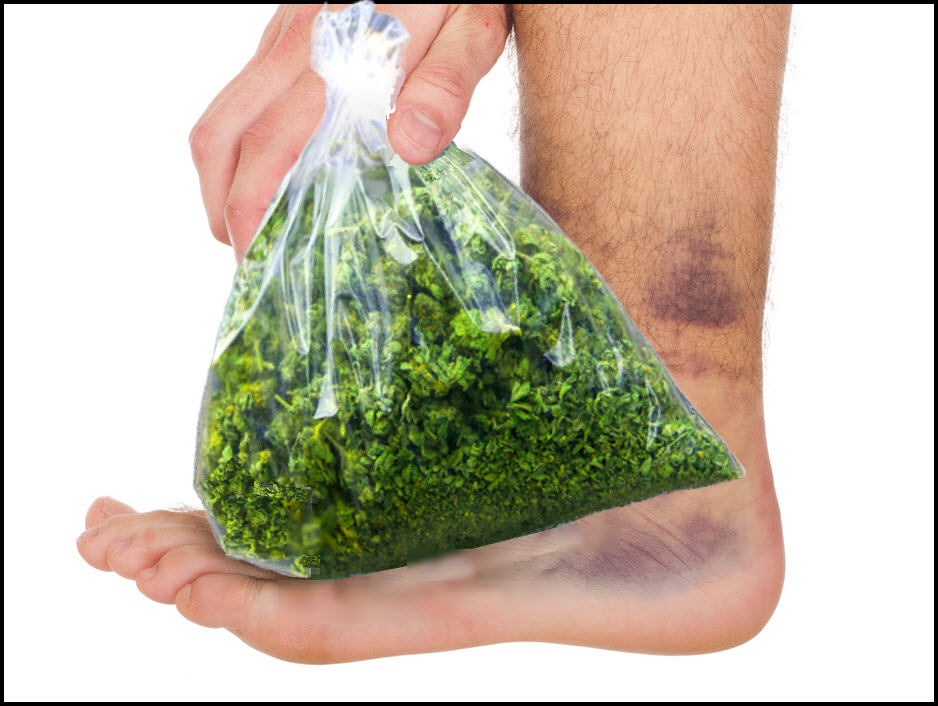
Why Use Cannabis, Not Ice, Next Time You Have An Injury
Using ice or a cold compress is one of the most well-known first aid treatments we know of for an injury or sprain.
It is usually best used right after the injury. This involves an ice pack or compress placed on the affected area to reduce inflammation and numb pain while reducing swelling. Exposure to cold is known to reduce blood flow and constrict blood vessels.
However, using cannabidiol (CBD), the non-psychoactive component of marijuana, may be more effective (and convenient) for treating sprains and injuries. In fact, it can completely replace ice. CBD is just more convenient because you can carry both topicals for spot treatment and oral CBD products in case of an accident. It also has the added benefit of being THC free, which is a benefit for athletes.
Sports injuries can also occur from running or jumping on hard surfaces, wearing the wrong shoes, using the wrong exercise technique, lack of mobility, old injuries, or playing the same sport year-round, among other things.
Frequent sports injuries
There are many different types of sports injuries where ice is typically used as first aid. We can experience them when we’re on a fitness regimen, although they’re more common in athletes, but the truth is they don’t choose – they can happen to anyone. In these cases, CBD can replace ice.
Sprains: Those who play sports can be prone to sprains. It occurs when a ligament (two ligaments in some cases) is torn, stretched, or twisted. Ligaments are long bands of tissue that wrap around joints or connect bones together. The most common site for sprains is the ankle and knee, causing pain and limitation of movement for the patient.
Strains: Strains are muscle injuries. This can happen when muscles become overextended or overextended during exercise. Strain occurs most often when making abrupt changes directly, such as jumping, running, or lifting.
Tennis Elbow: For golf and tennis enthusiasts, tennis elbow is common. This affects the outside of the elbows, leading to inflammation and, in some cases, chronic pain.
Runner’s Knee: Individuals who do marathons or triathlons that combine running and cycling can suffer from runner’s knee. This injury is caused by repetitive movements, resulting in pain and swelling under the kneecap, known as the patella.
Achilles tendon injury: The Achilles tendon, which connects the heel to the calf muscle, is the largest tendon in the human body. Injury here can occur with extensive walking, and pain occurs when the patient stands on the heel or toes, or when the ankle is stretched.
Why CBD works for sports-related injuries
A sprain or injury is always a major inconvenience. Whether you’re an athlete or not, recovery and healing at the earliest opportunity is crucial, not to mention the fact that it’s also extremely painful.
In athletes, opioids, ice, and other treatment mechanisms have been used at the first sign of pain and injury, although opioids are never recommended because they are addictive and have serious negative side effects that can be fatal. Using topical CBD to relieve pain and fight inflammation is a better option as it activates the endocannabinoid receptors in the affected area to control stiffness and pain. In addition, CBD interacts with the CB1 and CB2 receptors, which can reduce inflammation and pain caused by irritation and sports injuries.
This is important for anyone who exercises frequently, plays sports, or is simply prone to more injuries, as CBD shortens the recovery period while still keeping you feeling great.
“Sports injuries most often involve either a significant inflammatory response or mild microtrauma,” explains Dr. Andrew Kerklaan from Dr. Kerklaan Therapeutics to Aaptiv. “Because of CBD’s anti-inflammatory potential, it can be useful for a wide range of symptoms – from mild everyday pain to minor injuries.” He also explains that CBD can help individuals recover from common injuries caused by exercise will. “These will all set off the inflammatory response, and so CBD may have the potential to aid in the recovery process,” he says.
There are also dozens of studies touting the analgesic benefits of CBD. A 2020 study found that CBD is beneficial for chronic pain while improving inflammation and sleep. Then, in a 2018 review that analyzed 132 studies in Frontiers in Neurology, researchers discovered that CBD was effective at treating inflammation, relieving pain, and improving mobility in people with multiple sclerosis. “It is anti-inflammatory, antioxidant, antiemetic, antipsychotic and neuroprotective,” the study authors write.
How to use CBD for injuries
There are many CBD products on the market that work well for injuries. For muscle and tissue injuries, using topical products is a fast-acting and effective way to enjoy local relief. Topical products work faster than edibles. However, for those experiencing severe pain, tinctures and sublingual drops are recommended as they are the fastest of all delivery methods.
CBD can also be taken as an oil, while CBD-infused ointments and creams can be applied to the affected area several times during the week while you recover.
CBD can also be used before and after exercise for prevention.
CANNABIS FOR INJURIES, READ THIS…

CANNABIS IN TRAUMATIC BRAIN INJURY STARTS… READ THIS!

Post a comment: